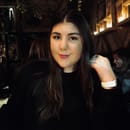Starting your resume is crucial when navigating the workforce and ultimately serves as an introduction to your future employer. A resume is supposed to be a comprehensive compilation of your education, professional and volunteer experience, and skills.
Here are five fundamentals for the perfect resume:
- Contact Information
-
The top of your resume should contain the best way to contact you including your name, current residence, phone number, email, and the link to your LinkedIn profile. This will provide a holistic way for your employer to reach you. Additionally, attaching your LinkedIn profile is another way for recruiters to see more of your past experiences and examples of your work.
If you use the Handshake platform, it is important to fill out your profile entirely with your contact information, recent experiences (jobs, internships, and volunteer work, etc), and coursework to strengthen your profile for potential recruiters. Handshake is a great platform that is designed with the student demographic in mind. I would recommend establishing a digital presence on both Handshake and LinkedIn, as LinkedIn is extremely beneficial for building your network, and Handshake has an array of experiences tailored to students. Utilizing the two platforms can strengthen your online professional residence.
- Your Main Objective
-
The main objective of your resume should be one or two sentences that describe why you are interested in applying for the specific job or internship. The objective section should also briefly describe your goals and skills that are relevant to the position you are applying for. The purpose of a resume objective is to clearly define your career goals within the position you are applying for and to show the company that you are the perfect candidate.
For example, “I am seeking the role of Associate Designer at Her Campus to utilize my three years of experience in project management, sourcing material, illustrating concepts associated with aesthetic, and increasing brand awareness through detailed marketing campaigns.” This is an example of how to connect your background with the goals of the job position and company.
- Education
-
The education section should include an array of information beyond your institution
and the degree you are pursuing. In this section, it is important to also list your recent and relevant completed coursework that will also highlight additional transferable skills.
For example, creating and designing presentations for your courses can be used to illustrate your proficiency in software, such as Google Drive or Microsoft. Another key tip to remember is to put your most recent education at the top of the section.
- Experience
-
The bulk of your resume is based on your past experiences, both paid and volunteer work. However, volunteer experience can be separated into another section if you see fit. The goal is to directly connect your previous work to the job that you are applying for. The experience section of your resume briefly describes the main responsibilities of the position and what you specifically contributed to the company. The structure is typically short sentences or bullet points.
To further communicate your contributions, it is recommended that you use a numeric value. For example, “I increased sales by 40% in the May to July 2020 period.” The experience section is also a great place to specifically talk about the skills you acquired from the opportunity. For instance, if you learned how to use Hootsuite, a social media management platform, you can describe how your previous job strengthened your skills in the social media marketing field.
Here is an example:
Associate Designer
Her Campus: Boston, MA February 2019 – December 2020
Conceptualized social media marketing for seasonal campaigns
Developed design workshops about social media trends and product management for the Her Campus internship
Increased sales by 40% in May to July 2020 period
Overall, the experience section should only highlight the most recent and relevant work that is directly related to the job you are applying for. This is a good opportunity to reflect on your experiences and to self-edit the length of your resume.
- Skills
-
This section of your resume provides an overview and summary of your skills. Undergraduate students generally use this space to list their computer, language, and interpersonal skills. Additionally, the skills section can be placed either at the top or the bottom of your resume.
Lastly, try to incorporate keywords throughout your resume that are associated with the industry. This is one of the most crucial parts of your resume that is often overlooked.. For example, when applying for a Social Media Marketing Manager position, you should use keywords such as campaign effectiveness, strategies, social media management, advertising, etc. Integrating keywords is specifically important for larger corporations, as they sometimes employ an applicant tracking software that will screen your resume for keywords related to the job description and requirements listed for the job. Once screened for keywords, your resume will be sent to human recruiters for additional review.
Creating and fine-tuning your resume can seem intimidating, however, starting with these resume fundamentals is the first step in applying for your next job or internship. My last tip is to keep your resume updated as you gain more experience, write down what skills you are actively acquiring, what new software you are practicing, and update your most recent coursework. Now go on, it’s time to get your dream internship or job!




